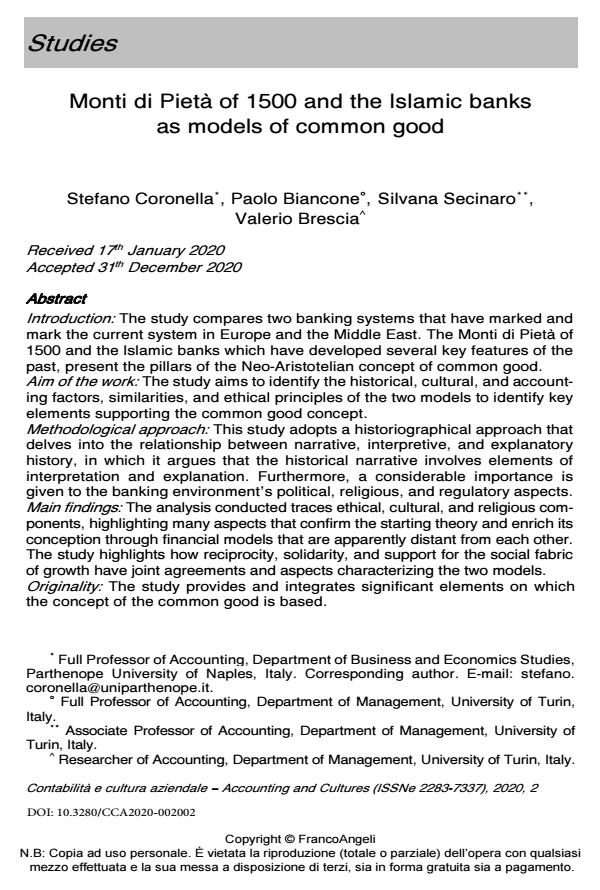Monti di Pietà of 1500 and the Islamic banks as models of common good
Titolo Rivista CONTABILITÀ E CULTURA AZIENDALE
Autori/Curatori Stefano Coronella, Paolo Biancone, Silvana Secinaro, Valerio Brescia
Anno di pubblicazione 2021 Fascicolo 2020/2
Lingua Inglese Numero pagine 34 P. 9-42 Dimensione file 178 KB
DOI 10.3280/CCA2020-002002
Il DOI è il codice a barre della proprietà intellettuale: per saperne di più
clicca qui
Qui sotto puoi vedere in anteprima la prima pagina di questo articolo.
Se questo articolo ti interessa, lo puoi acquistare (e scaricare in formato pdf) seguendo le facili indicazioni per acquistare il download credit. Acquista Download Credits per scaricare questo Articolo in formato PDF

FrancoAngeli è membro della Publishers International Linking Association, Inc (PILA), associazione indipendente e non profit per facilitare (attraverso i servizi tecnologici implementati da CrossRef.org) l’accesso degli studiosi ai contenuti digitali nelle pubblicazioni professionali e scientifiche.
Introduction: The study compares two banking systems that have marked and mark the current system in Europe and the Middle East. The Monti di Pietà of 1500 and the Islamic banks which have developed several key features of the past, present the pillars of the Neo-Aristotelian concept of common good. Aim of the work: The study aims to identify the historical, cultural, and accounting factors, similarities, and ethical principles of the two models to identify key ele-ments supporting the common good concept. Methodological approach: This study adopts a historiographical approach that delves into the relationship between narrative, interpretive, and explanatory history, in which it argues that the historical narrative involves elements of interpretation and explanation. Furthermore, a considerable importance is given to the banking environment’s political, religious, and regulatory aspects. Main findings: The analysis conducted traces ethical, cultural, and religious components, highlighting many aspects that confirm the starting theory and enrich its conception through financial models that are apparently distant from each other. The study highlights how reciprocity, solidarity, and support for the social fabric of growth have joint agreements and aspects characterizing the two models. Originality: The study provides and integrates significant elements on which the concept of the common good is based.
Parole chiave:Islamic finance, Monti di Pietà, financial system, common good, ethic, accounting.
- Exploring social exchange theory in Italian cultural heritage. A case study on the Ordine Mauriziano Foundation's Historical Archives Davide Calandra, Federico Lanzalonga, in CONTABILITÀ E CULTURA AZIENDALE 2/2022 pp.55
DOI: 10.3280/CCA2021-002003 - Corporate Social Responsibility and Diversity Management in Islamic Banking: A Bibliometric and Content Analysis With a Western Comparative Perspective Valerio Brescia, Massimo Cane, Maura Campra, in Business Strategy & Development e70261/2025
DOI: 10.1002/bsd2.70261
Stefano Coronella, Paolo Biancone, Silvana Secinaro, Valerio Brescia, Monti di Pietà of 1500 and the Islamic banks as models of common good in "CONTABILITÀ E CULTURA AZIENDALE" 2/2020, pp 9-42, DOI: 10.3280/CCA2020-002002